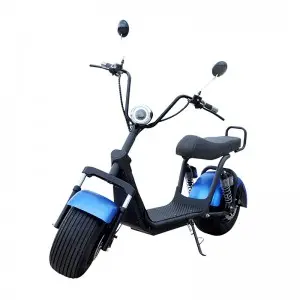Electric scooters have become a popular means of transportation for many people due to their convenience, environmental protection, and economy. One of the key components of an electric scooter is the battery, which powers the vehicle and determines its range and performance. As with any battery-powered device, the longevity of an e-scooter battery is a key factor for potential buyers and current owners to consider. In this article, we’ll explore the factors that affect e-scooter battery life and gain insight into battery life expectancy.
The service life of an e-scooter battery is affected by a variety of factors, including battery type, usage patterns, maintenance and environmental conditions. Most electric scooters are equipped with lithium-ion batteries, which are known for their high energy density, light weight, and long cycle life. However, the actual lifespan of a lithium-ion battery may vary depending on how it is used and maintained.
One of the main factors that determines the battery life of an electric scooter is the number of charge cycles it can withstand. A charging cycle refers to the process of completely charging and discharging the battery. Lithium-ion batteries have a limited number of charge cycles, typically 300 to 500 cycles, after which their capacity begins to decrease. For example, if a scooter battery is charged from 0% to 100% and then discharged back to 0%, it counts as one charge cycle. Therefore, the frequency of battery charging and discharging directly affects its lifespan.
In addition to the charging cycle, the depth of discharge also plays an important role in determining the lifespan of an e-scooter battery. Deep discharge (depletion of battery power to a very low level) accelerates the degradation of lithium-ion batteries. It is generally recommended to avoid deep discharge and keep the battery charge above 20% as much as possible to extend its service life.
Additionally, how you use an electric scooter can affect the life of the battery. Factors such as riding at high speeds, frequent acceleration and braking, and carrying heavy objects can put additional stress on the battery, causing it to degrade faster. Likewise, extreme temperatures (whether hot or cold) can affect the performance and lifespan of lithium-ion batteries. High temperatures cause the battery to degrade faster, while cold temperatures reduce its overall capacity.
Proper care and maintenance can also help extend the life of your electric scooter battery. Regular cleaning of the battery and its contacts, protecting it from moisture, and storing the scooter in a cool, dry place when not in use can help maintain battery performance. Additionally, following the manufacturer’s charging and storage guidelines can prevent unnecessary wear and tear on your battery.
So, how many years can an electric scooter battery last? While there is no clear answer, a well-maintained lithium-ion battery in an electric scooter will typically last between 2 and 5 years, depending on the factors mentioned above. But it’s important to note that the battery’s capacity will gradually decrease over time, resulting in reduced range and performance.
To maximize the life of an electric scooter battery, there are some best practices that owners can follow. Firstly, it is recommended to avoid leaving the battery in a fully discharged state for an extended period of time as this may cause irreversible damage. Likewise, storing a battery fully charged for an extended period of time will accelerate its degradation. Ideally, batteries should be stored in a cool, dry environment at about 50% capacity when not in use for long periods of time.
Additionally, using the scooter’s eco or energy-saving mode (if available) can help conserve battery energy and reduce stress on the motor and electronics. Additionally, avoiding fast charging, especially using high-power chargers, can help reduce stress on your battery and extend its life.
In summary, the life of an e-scooter battery is affected by a variety of factors, including battery type, usage patterns, maintenance, and environmental conditions. While a well-maintained lithium-ion battery can last 2 to 5 years, vehicle owners must understand the impact their usage habits and maintenance practices have on battery life. By following best practices and properly caring for their batteries, e-scooter owners can maximize their lifespan and ensure optimal performance for years to come.
Post time: Aug-02-2024


